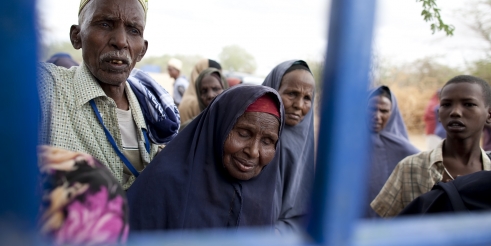
(c) Benjamin Schilling/HelpAge International
Older people getting food and supplies at a refugee camp in Kenya
By Ben Small
HelpAge International has joined other leading aid agencies to write a letter to the UN humanitarian chief raising concern about the omission of marginalised groups including older people, from the World Humanitarian Summit’s preparatory statement.
The statement came following a two-year consultation involving 23,000 individuals who provided their views on how we can reform emergency responses to reshape aid in the future.
The World Humanitarian Summit synthesis report, the result of the global consultations, placed significant emphasis on ending the neglect of marginalised groups and that humanitarian assistance needs to be adapted to cater for the diverse needs of all affected people, accommodating for differences in age, disability and gender.
In spite of this, a number of the clear priorities singled out in the report have not been recognised in the statement by Stephen O’Brien, Under-Secretary-General and Emergency Relief Coordinator of the United Nations Office for the Coordination of Humanitarian Affairs.
Our letter of response
Action Against Hunger, CBM, Christian Aid, Islamic Relief, Oxfam, Plan International, Save the Children and ourselves are among the NGOs that contributed to the consultation, coming together to call for the most vulnerable and marginalised groups to be placed at the core of emergency responses.
The letter calls for recognition that for humanitarian action to be impartial and effective, it must recognise and respond to vulnerability in all its forms.
“The humanitarian system is currently designed to deliver a one-size-fits-all response that is not adapted to the different needs of different groups. This creates one of the greatest and most significant barriers to the delivery of truly impartial and accountable assistance,” the letter reads.
The World Humanitarian Summit is a crucial opportunity for the UN to demonstrate it is committed to “leaving no one behind”, and recognising the specific needs of different affected people is central to this.
The recommendations
In the letter, the agencies made six recommendations designed to be inclusive of the needs of marginalised and vulnerable groups.
These measures highlight the importance of fully disaggregated data collection, inclusive delivery mechanisms, the knowledge and skills base of humanitarian agencies, ensuring those affected engage in assessments and consultations, and allocating funding that is equal to need.
By taking on board the letter’s recommendations, the road to the World Humanitarian Summit in Istanbul and the meeting itself can ensure future emergency responses are fit to meet the needs of the most vulnerable groups.
